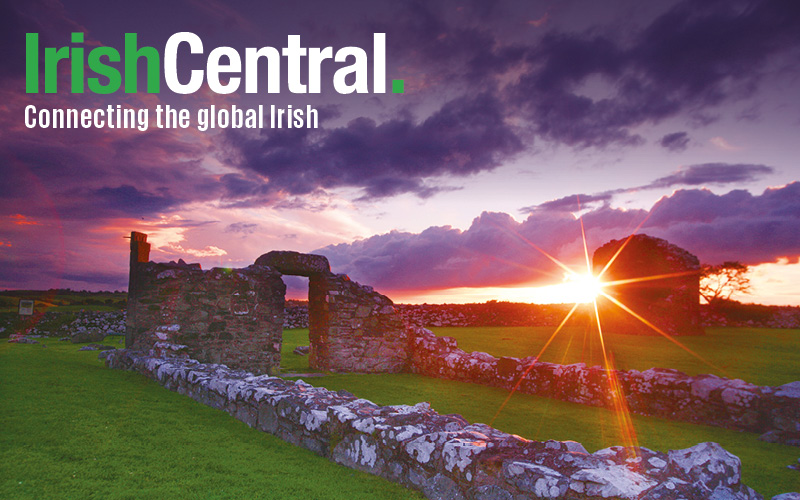Irish Writers Centre, Dublin, August 1997
Together, we entered the tall-windowed room on the second floor of the Irish Writers’ Centre. We, the participants of the Dublin Summer Writers’ Workshop, were there to attend a poetry reading. There was a podium at the front and rows of chairs set up before it. The room had a fireplace, gentle red walls and the hush of a library or a church.
Most of us were staying in dorm rooms Trinity College. When I remember now, I always think of Trinity at night, the buildings quiet in the dark, cobblestones lit by moonlight, the rumors of ghosts.
This was my first trip to Ireland; I was twenty-six years old. The day after I first saw the program advertised in Poets & Writers Magazine, I began the process of getting my passport.
During the day, we attended writing workshops and in the evenings, there were readings, either poetry or prose, by the writers who were teaching, among them, Gerry Beirne, Paula Meehan and Theo Dorgan.
I rarely went to readings, even though I worked in Manhattan and I surely could have found one just about any night of the week. When I did go, it was with the thought of networking because I’d read time and time again that to get published, you needed connections. Yet, overcome by shyness, I never tried very hard to talk to anyone. I suppose I was actually hoping to be discovered, as though the ability to write could be spotted, like beauty.
In Ireland, though, I learned to listen.
I especially came to appreciate the authors’ introductions, where they’d give the biography of a poem or piece of prose. That is, how and why it came to be written.
Theo Dorgan was reading that night. Born in Cork in 1953, he lived in Dublin then and still does. He is a poet and prose writer, editor and translator and a member of Aosdána, an organization that honor artists whose work has made a significant contribution to the arts in Ireland.
Theo stood at the podium, holding Rosa Mundi, his book of poetry published by Salmon Poetry. The cover was striking—a circle, edges glowing, on a black background, with a rose window in its center.
Before Theo began reading, for the sake of the mostly American audience, he gave a brief outline of the Easter Rising, itself a failure but ultimately the catalyst that would lead to Irish independence from England.
The Easter Rising began on April 24, 1916 when the Irish Volunteers, armed with rifles, seized control of Dublin’s General Post Office, as well as several other buildings in Dublin, and Padraig Pearse, Rising leader, poet and schoolteacher, read aloud the Proclamation, a document that declared, “the right of the people of Ireland to the ownership of Ireland.” After six days of fighting, overwhelmed by a crushing British military response, Pearse surrendered.
Six years ago, Theo told us, he had attended a 75th Anniversary Commemoration of the Easter Rising, held in Kilmainham Gaol. Space was limited. As the program began, the audience heard angry shouts outside from those who had arrived too late to be seated. Let us in! Let us in!, they chanted. Theo then quoted someone, whomever was acting as host? (I’ll never remember), but this person said, “Only in Ireland would there be a riot outside a prison of people trying to get in.”
In the Irish Writers Centre, we laughed, as the audience from 1991 surely had. Theo then explained that the poem he was about to read, Kilmainham Gaol, Dublin, Easter 1991, was dedicated to Frank Harte, a renowned singer of Irish traditional songs, who performed that evening. The poem recounts what happened when Frank Harte began to sing in Kilmainham Gaol, where sixteen leaders of the Easter Rising were executed by firing squad.
Theo began to read in a slow, grave voice. In the third verse of the poem:
“The singer surveys his audience, heat rising
To the tricolour and plough overhead.
As the first words of Galvin’s lament climb to
invoke
James Connolly’s ghost, we are joined by the dead.”
I say this as calmly as I can.”
Inside the poem, Frank Harte’s voice rises above the living audience to the prison’s catwalks, where the dead men of 1916 have gathered to listen, not haunting, but haunted, still imprisoned though “the guards have long since vanished.”
Before, I believed that Easter,1916 by William Butler Yeats was the only poem that must be read about the Easter Rising. Yeats wrote it between May and September 1916 and it is very much a reflection of the wider public sentiment of the time. He writes of brave men whose cause was not embraced until after their deaths. Indeed, because of their deaths. Yet whereas William Butler Yeats wrote of martyrs, Theo Dorgan wrote of men:
“Still stunned by gunfire, wounds, fear for their
families.
Paralysed until now by the long valleys of May so
long ago.”
From the safe perch of history, it’s easy to see the executions as tragic, but necessary, to get to the part of the story where Ireland (part of Ireland) is finally independent of England.
Yet before the men of 1916 were martyrs, they were sons, brothers, husbands and fathers. They faced their deaths stoically, but bravery doesn't exist without fear. They were afraid. Take solace in knowing that their deaths were ultimately not in vain. But before solace, there is only grief.
Listening to Theo Dorgan read his poem, I understood for the first time that before 1916 became beautiful, it was only terrible.
After Theo's reading, four of us went out to Temple Bar together. The pub, Isolde's Tower, was crowded and we ended up sitting cross-legged on the floor beneath a round counter-high table. We talked about the reading and how during Kilmainham Gaol, Dublin, Easter 1991, the room was eerily silent. No clothing rustled. No chair creaked. There was not so much as a cough.
Perhaps just as the dead were drawn to Frank Harte’s song in 1991, they came for Theo’s poem in 1997. Perhaps they gathered in the back of the room at the Irish Writers Centre and, along with us, heard Theo read:
“I do not know that there is a heaven but I saw their
souls
Fan upward like leaves from a dry book, sped out
into the night
By volleys of applause; sped out, I hope, into some
light at last.”
The men of 1916, ghosts at rest, nodded. Yes. Yes it happened just that way.
This article was submitted to the IrishCentral contributors network by a member of the global Irish community. To become an IrishCentral contributor click here.




Comments